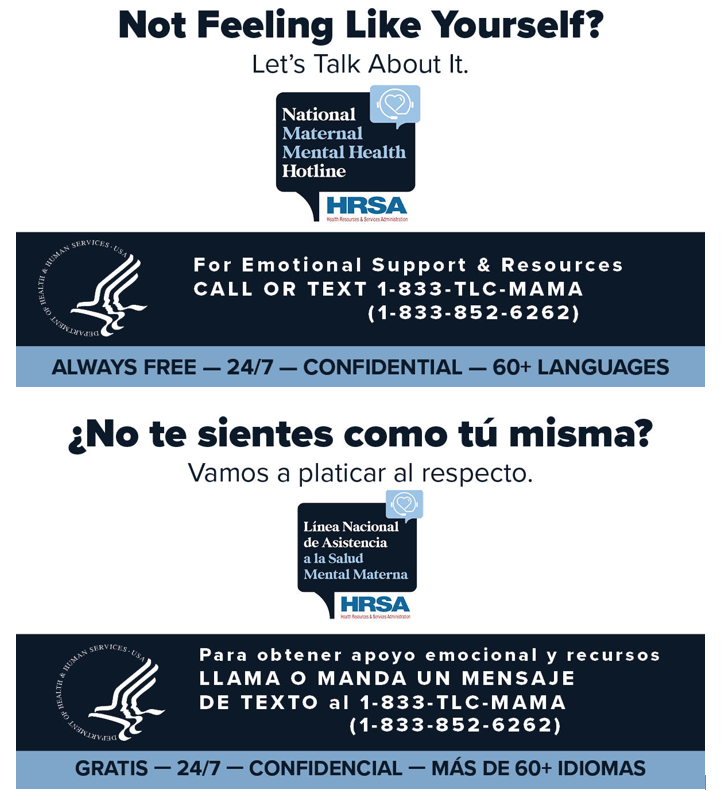Author: CT Legal
HRSA’s Maternal Mental Health Hotline

HUD is partnering with HHS to promote their National Maternal Mental Health Hotline, which provides, free, confidential, 24/7 emotional support, resources, and referrals to pregnant and postpartum individuals facing mental health challenges and their loved ones.
In addition to these resources, professional counselors are available to offer support via phone and text in English and Spanish, and they also provide interpreter services in 60 additional languages and a relay service for deaf and hard-of-hearing callers.
CLS Executive Director Deborah Witkin received the Connecticut Bar Foundation’s Anthony M. Fitzgerald Award for excellence
CLS Executive Director Deborah Witkin received the Connecticut Bar Foundation’s Anthony M. Fitzgerald Award for excellence at the 2023 Connecticut Bar Foundation Annual Reception. CLS’ former Executive Director, Steve Eppler-Epstein, was honored to present the award. Debi was accompanied by CLS Deputy Director Anne Louise Blanchard, family members, and colleagues who cherished her achievement. Congratulations once again, Debi!






The Importance of a fully refundable CT Child Tax Credit

Watch our 4th and final video on how to maximize your SNAP benefit
Welcome back to our video series where we continue to discuss ways you can maximize your SNAP benefits. This will be the final installment in our weekly series. Please leave us feedback in the comments if you would like to see more videos like this in the future.
As a reminder, the extra COVID SNAP benefit you have been receiving is coming to an end due to a change in the law. The extra, mid-month benefit you would have received on February 15th was the last one. Starting in March you will be back to receiving one monthly SNAP deposit on one of the first three days of the month.
However, there are steps you can take to maximize your SNAP by telling DSS about your income and monthly expenses. Remember, reducing your income through deductions can sometimes result in an increase of your SNAP. In our week 2 video, we talked about the dependent care deduction—which allows DSS to deduct the costs of some daycare from your countable income; the medical expense deduction for those 60 or over or disabled with out of pocket medical expenses, such as driving to the doctor or picking up your prescriptions, of over $35 a month, and the deduction of court ordered child support payments from your countable income. In week 3, we discussed the shelter expense deduction, which factors in your rent or mortgage as well as a set amount for utility costs.
There are also other programs that can help ensure you keep food on your table. The first program is the WIC Program. WIC is available to those who are low-income, nutritionally at risk, and pregnant, postpartum, breastfeeding or households with infants and children up to age 5. WIC participants can receive nutrition counseling and an EBT card to buy healthy foods.
If you are a WIC participant or over 60 you may be eligible for the Farmers’ Market Nutrition Program. This program provides coupon booklets so participants can purchase fresh fruits and vegetable at local farmers’ markets. You can find out more by reaching out to your local WIC office or senior center.
Finally, reach out to your town social worker or call 211—they both may be a good source of additional resources such as locations of local food pantries in your area.
We hope you have found these weekly videos helpful and informative. Be sure to follow CT Legal Services on Facebook and Twitter to keep up to date on information and events.
Watch the 4th and final video in our 4 part weekly series
Bienvenido de nuevo a nuestra serie de videos donde continuamos analizando las formas en las que puedes maximizar tus beneficios de SNAP. Esta será la última entrega de nuestra serie semanal. Si te gustaría ver más videos como este en el futuro déjanos saber aquí en los comentarios.
Como recordatorio, el beneficio adicional de COVID SNAP que ha estado recibiendo está llegando a su fin debido a un cambio en la ley. El beneficio adicional a mitad de mes que habría recibido el 15 de febrero fue el último. A partir de marzo, volverá a recibir un depósito mensual de SNAP en uno de los primeros tres días del mes.
Sin embargo, hay pasos que puede seguir para maximizar su SNAP informando al Departamento de servicios sociales sobre sus ingresos y gastos mensuales. Recuerde, reducir sus ingresos a través de deducciones ya que puede resultar en un aumento de su SNAP. En nuestro video de la semana 2, hablamos sobre la deducción por cuidado de dependientes, que le permite al Departamento de servicios sociales deducir los costos de algunas guarderías de sus ingresos contables; la deducción de gastos médicos para personas mayores de 60 años o discapacitadas con gastos médicos de su bolsillo, también el cómo conducir hasta el médico o recoger sus recetas, de más de $35 al mes, y la deducción de los pagos de manutención infantil ordenados por la corte de su ingreso contable. En la semana 3, discutimos la deducción de gastos de vivienda, que tiene en cuenta su alquiler o hipoteca, así como una cantidad fija para los costos de servicios públicos.
También hay otros programas que le pueden ayudar a garantizar que mantenga la comida en su mesa. El primer programa es el Programa WIC. WIC está disponible para personas de bajos ingresos, en riesgo nutricional y embarazadas, posparto, lactantes u hogares con bebés y niños de hasta 5 años. Los participantes de WIC pueden recibir asesoramiento sobre nutrición y una tarjeta EBT para comprar alimentos saludables.
Si es un participante de WIC o tiene más de 60 años, puede ser elegible para el Programa de Nutrición del Mercado de Agricultores. Este programa proporciona folletos de cupones para que los participantes puedan comprar frutas y verduras frescas en los mercados de agricultores locales. Puede obtener más información comunicándose con su oficina local de WIC o centro para personas mayores.
Finalmente, comuníquese con el trabajador social de su ciudad o llame al 211; ambos pueden ser una buena fuente de recursos adicionales, como ubicaciones de despensas de alimentos locales en su área.
Esperamos que estos videos semanales le hayan resultado útiles e informativos. Asegúrese de seguir a CT Legal Services en Facebook y Twitter para mantenerse actualizado sobre información y eventos.
Watch our video to maximize your SNAP benefit – shelter expense deduction
Welcome back to our weekly video series discussing ways you can maximize your SNAP benefits. This week we’ll be discussing the shelter expense deduction. This deduction takes into account your rent or mortgage cost as well as a set amount for utility expenses. This total shelter expense deduction is factored in to reduce your countable income. Remember, reductions in income equal an increase in SNAP benefits.The amount factored in for your rent or mortgage is limited to $624, unless your food stamps household contains an elderly or disabled member. This means that in households with someone disabled or 60 years or older, the entire rent or mortgage can be factored in. This is an important deduction and could have a large impact on some households given the rise in housing costs and rents. If your housing costs have increased be sure to report this to DSS as soon as possible.
Join us next week for our final video installment where we’ll recap the deductions we’ve already discussed and share other ways you can keep food on the table.
Watch the 3rd video in our 4 part weekly series
Bienvenido de nuevo a nuestra serie de videos semanales que analizan las formas en que puede maximizar sus beneficios de SNAP. Si tiene algún comentario, comuníquelos aquí en la sección de comentarios.
Esta semana discutiremos la deducción de gastos de vivienda. Esta deducción tiene en cuenta el costo de la renta o la hipoteca, así como una cantidad fija para los gastos de servicios públicos. Esta deducción total de gastos de alojamiento aplica para reducir su ingreso contable. Recuerde, las reducciones en los ingresos equivalen a un aumento en los beneficios de SNAP. La cantidad factorada para su alquiler o hipoteca está limitada a $624, siempre y cuando no haiga alguien en su hogar que reciba cupones para alimentos o haiga una persona de 60 años o más o alguien discapacitado. Esto significa que en los hogares con una persona discapacitada o de 60 años o más, se puede incluir la totalidad del alquiler o la hipoteca. Esta es una deducción importante y podría tener un gran impacto en algunos hogares dado el aumento en los costos y alquileres de la vivienda. Si sus costos de vivienda han aumentado, asegúrese de informar esto al Departamento de servicios sociales lo antes posible.
Únase a nosotros la próxima semana para nuestra última serie de video donde recapitularemos las deducciones que ya hemos discutido y compartiremos otras formas en las que puedas mantener comida en su mesa
The extra COVID SNAP benefit is ending watch our video to maximize your SNAP benefit
REMINDER: The extra COVID SNAP benefit is ending! Check out the video below for information on the childcare, child support, and medical deductions that can maximize your SNAP benefit.
Watch our 2nd video in our 4 part weekly series
RECORDATORIO: ¡El beneficio adicional de COVID SNAP está por terminar! Mire el video a continuación para obtener información sobre el cuidado de niños, la manutención de niños y las deducciones médicas que pueden maximizar su beneficio de SNAP.
Starting in March 2023 the extra COVID relief SNAP benefit will end
Starting in March the extra COVID relief SNAP benefit will end and only one SNAP deposit will be made. Over the next few weeks, we will be talking about ways that you may be able to maximize your SNAP.
Watch our 1st video in our 4 part weekly series.
A partir de marzo, el beneficio adicional de SNAP de alivio de COVID finalizará y solo se realizará un depósito de SNAP. Durante las próximas semanas, hablaremos sobre las formas en que puede maximizar su SNAP.
Free Virtual Legal Advice Clinic on Jan 24th & Jan 25th 2023
Sign up now & meet with a volunteer lawyer for a free 30-minute session to receive legal advice over Zoom
Carr v. Bremby Settlement
The Final Approval Hearing for the Non-emergency Medical Transportation class action against the Connecticut Department of Social Services (DSS) and Veyo took place on August 29, 2022 and the Court issued its final approval order on September 6, 2022.
Click here to see a copy of the Settlement Agreement entered into among the parties.

